You might not have known Mathieu van der Poel (Alpecin-Fenix) was racing this past weekend, or that he executed one of the most improbable rides you’ll ever see. The Dutchman was racing at the Coppi e Bartali, a five-day Italian stage race with a stacked start list that included Vincenzo Nibali (Astana Qazaqstan), Marc Hirschi (UAE-Team Emirates), Geraint Thomas (Ineos Grenadiers), and a super-strong squad from Quick-Step Alpha Vinyl Team.
Also read: Biniam Girmay — ‘Gent-Wevelgem win is so important for me, for my team, and for African cycling’
If Biniam Girmay (Intermarché-Wanty-Gobert Matériaux) posted his rides on Strava, this article would surely be about him, the 21-year-old who became the first Black African to win a Belgian Classic, and who did so on his debut at the race. The Eritrean won’t be lining up at the Tour of Flanders this weekend, but van der Poel will – and based on his performance at Coppi e Bartali, his rivals should be worried.
The multi-time world cyclocross champion had been battling a back injury since his crash in the XC mountain bike race at last year’s Olympics, and his Strava files reveal that van der Poel barely trained until mid-February of this year. By the time he made it to team camp in Spain, he was doing three- to six-hour rides with very few intervals. In fact, most rides would be completed at an average of 220-250w and an average heart rate of 130-140bpm.
Also read: Mathieu van der Poel back in the winner’s circle at Coppi e Bartali
Fast forward to the end of March – only four weeks later – and van der Poel is averaging nearly 400w for an hour, and driving the breakaway for 60km on stage 4 of Coppi e Bartali.
An early breakaway took the lead at the beginning of stage 4, a 156km, multi-part circuit that included over 2,400m (7,870 ft.) of climbing. The main feature of the course was the 3.1km at 5.4 percent climb up the Vico, which the riders would crest a total of eight times. But that wasn’t all – at kilometer 57, the riders would turn off of the main loop and begin the Goraiolo climb, a serious ascent of 15.1km at an average of 4.8 percent (though this includes a flat section in the middle of the climb, so most the gradient averages about 6 percent).
Ineos Grenadiers controlled the early goings for race leader Eddie Dunbar, and so van der Poel enjoyed a nice and easy warm-up to his 60km attack.
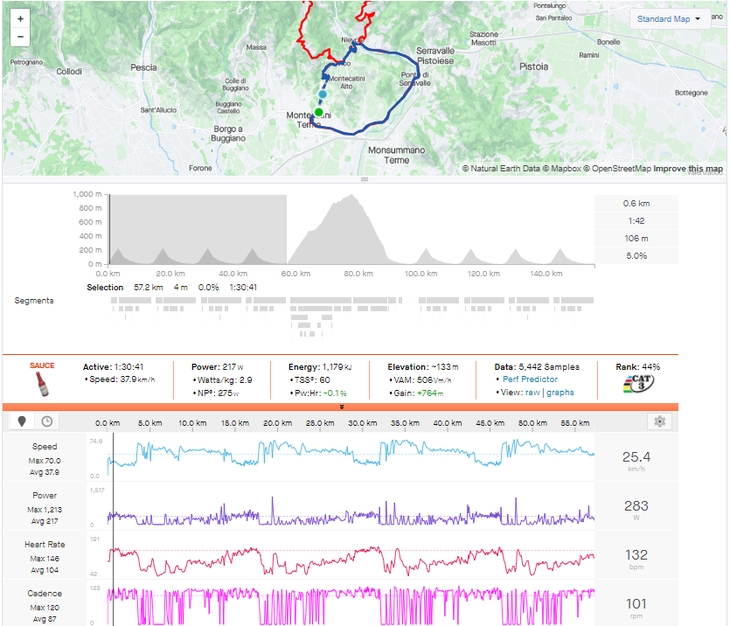
Van der Poel – easy start to stage 4
Time: 1:30:41
Average Power: 217w (2.9w/kg)
Normalized Power: 275w (3.7w/kg)
Even the pace up the Goraiolo was quite comfortable, based on van der Poel’s average heart rate of 155bpm at 5.1w/kg. The Dutchman’s progress is unbelievable and is among the fastest return to form that I have ever seen. On February 26th – exactly one month before this stage – van der Poel did a power test on the Coll de Rates, one of the most popular testing grounds in cycling. At nearly the same power, van der Poel’s heart rate was 23bpm higher than Coppi e Bartali.
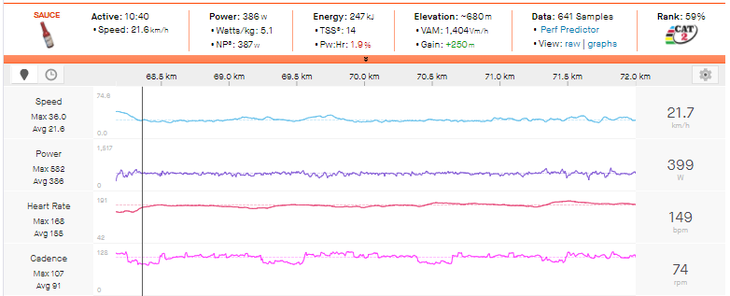
Van der Poel – Goraiolo (steep section)
Time: 10:40
Average Power: 386w (5.1w/kg)
Average Heart Rate: 155bpm
Goraiolo (full climb): 337w (4.5w/kg) for 46:05
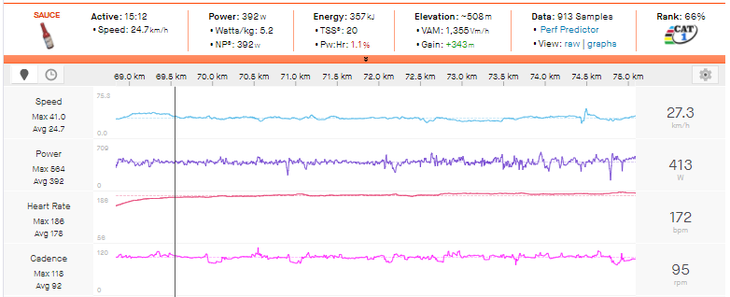
Van Der Poel – Coll de Rates power test on February 26th
Time: 15:12
Average Power: 392w (5.2w/kg)
Average Heart Rate: 178bpm
After descending the Goraiolo and rejoining the Vico circuits, van der Poel attacked – and this is where the fun began.
The Dutchman quickly bridged across to the breakaway all on his own, whose lead was less than three minutes on the peloton with 60km to go. Van der Poel increased the breakaway’s lead by driving the pace up the Vico climb, pushing 400w for 10-15 minutes at a time.
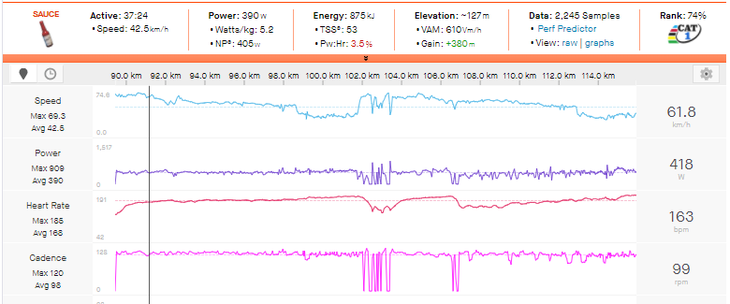
Van der Poel – huge effort bridging to the breakaway
Time: 37:24
Average Power: 390w (5.2w/kg)
Normalized Power: 405w (5.4w/kg)
Peak 20min Power: 418w (5.6w/kg)
Van der Poel was pushing 500w on the steepest sections of the Vico each and every lap, so it wasn’t a huge surprise when the breakaway began disintegrating behind him. Their gap to the peloton came under two minutes inside 30km to go, and it wasn’t long until their lead went under a minute. Despite averaging more than 5w/kg for the last hour, van der Poel had the power to attack on the final climb of the day. And not only did he distance his breakaway companions, but he left them in the dust when he sprinted off the front at 1,300w.
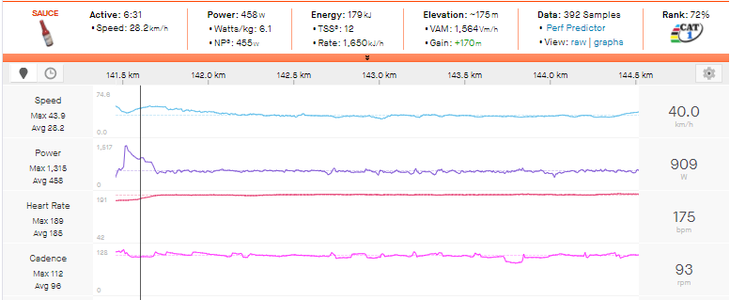
Van der Poel – Final Vico Climb
Time: 6:31
Average Power: 458w (6.1w/kg)
Max Power: 1,315w (17.5w/kg)
Peak 20min Power: 418w (5.6w/kg)
Despite his best efforts, van der Poel couldn’t hold off the charging peloton, and he was caught on the descent with 9km to go. The Dutchman casually glanced back at the peloton as they came roaring by, slotting back into the field as counterattacks went off the front.
Between his 55km breakaway and the final sprint, van der Poel had just 10 minutes to recover. Yet, his fitness looks better than ever, and his heart rate was able to settle down into the 140s with 5km to go. Ineos Grenadiers, Quick-Step Alpha Vinyl, and van der Poel’s own Alpecin-Fenix shared pace-making duties in the final kilometers, lining out the lead group as they approached the finish line in Montecatini Terme.
Van der Poel stayed tucked in the wheels, patiently waiting for an opening in the final few hundred meters. And when van der Poel unleashed his sprint with 200m to go, there was no question about his form. Hitting a peak of 1,517w, these are some of the best sprint numbers we’ve ever seen from van der Poel, and at the end of a 60km breakaway.
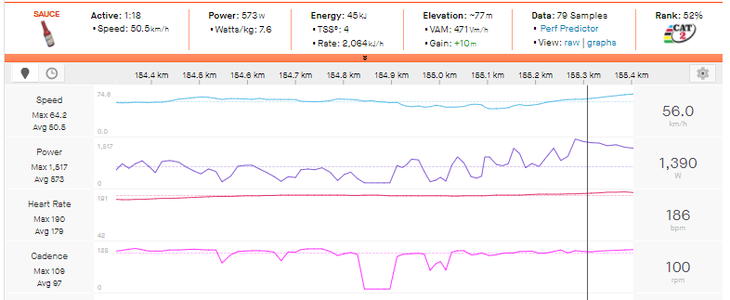
Van der Poel – final kilometer
Time: 1:18
Average Power: 573w (7.6w/kg)
Peak 5sec Power: 1,399w (18.7w/kg)
Final sprint: 1,008w (13.4w/kg) for 22 seconds
Max Power: 1,517w (20.2w/kg)
In looking at the data and timing of van der Poel’s attack, it would be fair to guess that the Dutchman’s coach told van der Poel to attack at precisely this point. With the rest of the spring classics coming up fast, and the Tour of Flanders only a few days away, Alpecin-Fenix knows exactly what it takes for van der Poel to win.
As we see time and time again, the spring classics such as the Tour of Flanders, Amstel Gold Race, and Paris-Roubaix are six-hour races but the action is usually in the final 90 minutes. Everything before that is a prelude, a hard but indecisive turning of the pedals meant to fatigue both the body and mind. But soon the bell tolls – at the 50km to go banner – and the best riders in the world know what’s coming.
Inside the final hour, all hell breaks loose. Attacks are thrown left, right, and center and chains are lost as well as heads. Some riders will miss the move, and their day is done. The final hour and a half is always the hardest, and when Mathieu van der Poel goes motoring off the front with 45km to go, you better be on his wheel because he’s not slowing down.
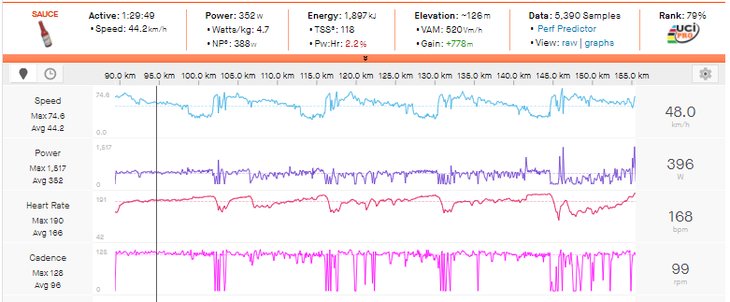
Van der Poel – final 90 minutes of Coppi e Bartali stage 4
Average Power: 352w (4.7w/kg)
Normalized Power: 388w (5.2w/kg)
Peak Breakaway Power: 395w NP for 1hour 17min
Power Analysis data courtesy of Strava and Strava sauce extension
Riders: Mathieu Van Der Poel
